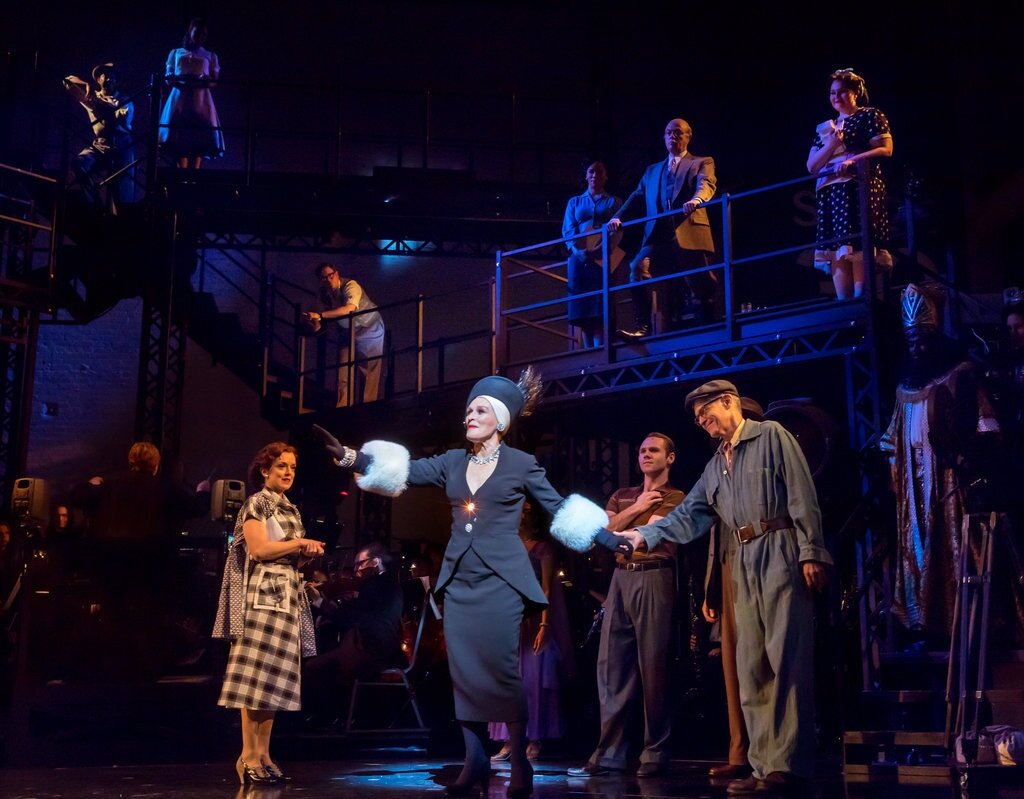Sunset Boulevard
Originally published on Paste Magazine
View this story online
It’s an ironic experience, to say the least, to watch a merciless exploration of fame and its dismissive treatment of women performed by arguably one of the most famous actresses in America. But irony is hardly the lasting impression left by the revival of Sunset Boulevard that has taken up residence at Broadway’s Palace Theater. Rather, the lingering feeling is that of admiration as well as, however reluctantly admitted, discomfort.
Twenty-three years after since her original, Tony-winning performance as Norma Desmond, Glenn Close has returned to the role of the fading film star clinging desperately to the past. And in those two decades since she last descended down the staircase of John Napier’s legendarily ornate set, Close’s grasp on the role appears to have only tightened.
With a score by Andrew Lloyd Webber and book and lyrics by Don Black and Christopher Hampton, Sunset Boulevard faithfully follows the plot of Billy Wilder’s acclaimed film. But while it tells the same story as the award-winning movie, it has failed to duplicate or recreate the haunting, brooding atmosphere of the film. While Wilder represented the shadowy depths of Norma’s mind through the faded grandeur of her home, James Noone’s sparse set, consisting of overlapping metal staircases and a few pieces of wheeled furniture, accompanied by numerous projections, more resembles a factory than the reclusive Hollywood hideaway of an aging star.
It is this home that the struggling writer Joe Gillis stumbles upon while fleeing aggressive loan sharks and thus meets the self-proclaimed “greatest star” and her devoted butler Max (played with imposing grandeur by Fred Johanson).
A minimalistic setting could easily be the home of many a musical, but not this one. Both Webber’s lush, sweeping orchestrations, performed by a 40-piece orchestra stationed onstage, and Close’s ferociously relentless performance are out of place in such a setting and leave a lasting impression of confusion and juxtaposition. What isn’t confusing though, is that Close is having a grand time.
From the moment she first appears, Close plays Norma as hovering on the edge of full-blown insanity, singing a mournful goodbye to her recently deceased pet monkey before defiantly informing Joe of her stature and status in Hollywood.
Grandly attired in Anthony Powell’s costumes from the original 1994 production, which feature endlessly glittering caftans, she vamps and camps, depicting Norma’s persona of grandeur and elegance as well as eccentricities and insanity, but her singing voice sounds strained at times as she powers through Webber’s challenging score of soaring arias. (Sadly, the lyrics, which include lines like, “I must say RKO are OK” and “While you’ve been buying vicuna coats I’ve been making a lot of notes,” are clunky and pedestrian.)
The book neglects to provide much backstory to Norma to provide any context for her desperation to return to stardom other than that she was discovered at 17. Now that she is 50, her career is decidedly over, and she desperately, to the point of delusion, longs to return to her days of glory. Her vulnerability, achingly childlike during the song, “New Ways to Dream” as she recalls the promise of youth in Hollywood, progresses to dependency and obsession with the youthful and handsome Joe. And she intends to return to Hollywood by way of a new script and starring vehicle, featuring her as Salome, with Joe’s help.
Played by Michael Xavier with wry cynicism and charming self-deprecation, Joe is a disillusioned youth escaping disappointment by residing in Norma’s grasp. His delivery of the title song offers glimpses into his increasing self-loathing as he sinks further and further into her life, becoming her lover as well as her screenwriter. It’s only when he finds himself also romancing the idealistic, sincere and sensible Betty Schaefer (played by the golden-voiced Siobhan Dillon, spiritedly doing everything she can with a disappointingly underwritten role) that he attempts to escape Norma’s clutches.
Betty and Norma are the only female characters with names, let alone any defining characteristics in Sunset Boulevard, a fact offering a telling look at that era – and present-day – in Hollywood, where the treatment of older women is hardly sympathetic. For Norma to regain her glory, she needs to regain her youth – an impossible feat no matter how desperately she tries. This is no more apparent than Norma’s pays a misguided visit back to the Hollywood set to reunite with her former director, Cecil B. DeMille (played by a subtle and effective Paul Schoeffler). The man himself comments that he, who is still busily working, is old enough to be her father, while she apparently is too old to ever star in a film again.
The character of Norma could appear campy or a cruel stereotype in the hands of a lesser skilled actress, but Close’s talent is evident, especially through her tremulous performance of “As If We Never Said Goodbye,” sung with trembling rapture as she gazes around the film set.Unfortunately, other characters do fall prey to this trap, including the head wardrobe man in the song “The Lady’s Paying” presented as nothing more than a gay stereotype. A German psychotherapist and an astrologer also inspiring cringes, as does the heavy-handed staging, which involves actors running around the stage with hand-held headlights lights to represent a car chase, and the questionable decision to hang the corpse of Joe from the ceiling for the entirety of the show, which is told as a flashback. The body’s presence is fitting for a show that, despite its minimalistic set, is hardly lacking in subtlety.
While the film Sunset Boulevard is an undisputed masterpiece, the same cannot be said of the musical.

